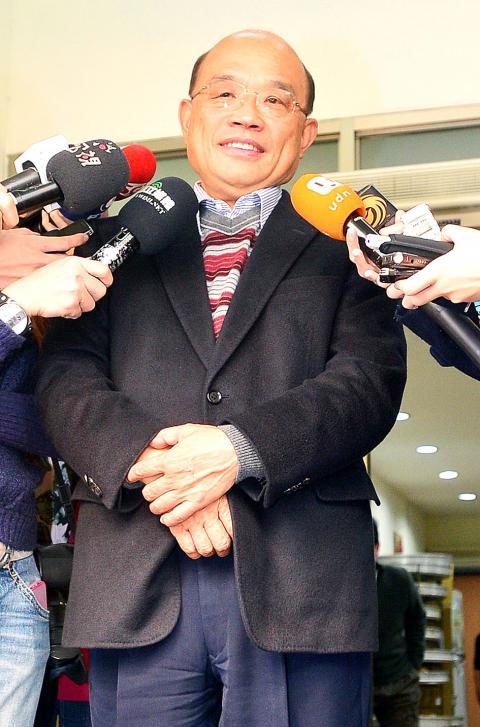The Central Election Commission (CEC) yesterday announced its final decision to combine the presidential and legislative elections next year, to save money and increase voter turnout.
“CEC members decided during a meeting today that the 14th presidential and the 9th legislative elections [next year] shall be held on the same day,” CEC Chairman Liu I-chou (劉義周) told a press conference after the meeting. “As for the date of the elections, the CEC will call a meeting with local election commissions to decide.”
Although a date has not been set, the elections are likely to be held in January next year, before the start of a new legislative session the following month.

Photo: Wang Yi-sung, Taipei Times
Liu said that according to three public hearings and an opinion poll, most people support combining the elections.
“Holding the two elections on the same day can help save money and social resources by avoiding repeated large-scale political mobilizations within a short time,” he said. “Moreover, compared with the 2008 presidential and legislative elections — which were held separately — the number of voters in the 2012 combined elections rose by about 3.3 million.”
Liu said the decision was also made to ensure policy continuity, since the 2012 presidential and legislative elections were held on the same day, as were last year’s nine-in-one elections.
Liu said concerns raised by Chinese Nationalist Party (KMT) Chairman Eric Chu (朱立倫) over the large gap between the elections in January and the presidential inauguration on May 20 would not be a problem.
“The nation has its own laws and systems to deal with the issue,” Liu said. “Besides, there would also be an empty period if the presidential election is postponed.”
Democratic Progressive Party (DPP) Legislator Wu Ping-jui (吳秉叡) welcomed the decision, saying that combined elections might save the nation up to NT$500 million (US$15 million).
Meanwhile, DPP spokesperson Cheng Yun-peng (鄭運鵬) urged the commission to draft laws and regulations to institutionalize combined legislative and presidential elections to avoid more debates on the issue.
KMT Legislator Lai Shyh-bao (賴士葆) said he respected the commission’s decision, adding that he did not think the change would make much difference to the party.

SECURITY: As China is ‘reshaping’ Hong Kong’s population, Taiwan must raise the eligibility threshold for applications from Hong Kongers, Chiu Chui-cheng said When Hong Kong and Macau citizens apply for residency in Taiwan, it would be under a new category that includes a “national security observation period,” Mainland Affairs Council (MAC) Minister Chiu Chui-cheng (邱垂正) said yesterday. President William Lai (賴清德) on March 13 announced 17 strategies to counter China’s aggression toward Taiwan, including incorporating national security considerations into the review process for residency applications from Hong Kong and Macau citizens. The situation in Hong Kong is constantly changing, Chiu said to media yesterday on the sidelines of the Taipei Technology Run hosted by the Taipei Neihu Technology Park Development Association. With

A US Marine Corps regiment equipped with Naval Strike Missiles (NSM) is set to participate in the upcoming Balikatan 25 exercise in the Luzon Strait, marking the system’s first-ever deployment in the Philippines. US and Philippine officials have separately confirmed that the Navy Marine Expeditionary Ship Interdiction System (NMESIS) — the mobile launch platform for the Naval Strike Missile — would take part in the joint exercise. The missiles are being deployed to “a strategic first island chain chokepoint” in the waters between Taiwan proper and the Philippines, US-based Naval News reported. “The Luzon Strait and Bashi Channel represent a critical access

‘FORM OF PROTEST’: The German Institute Taipei said it was ‘shocked’ to see Nazi symbolism used in connection with political aims as it condemned the incident Sung Chien-liang (宋建樑), who led efforts to recall Democratic Progressive Party (DPP) Legislator Lee Kun-cheng (李坤城), was released on bail of NT$80,000 yesterday amid an outcry over a Nazi armband he wore to questioning the night before. Sung arrived at the New Taipei City District Prosecutors’ Office for questioning in a recall petition forgery case on Tuesday night wearing a red armband bearing a swastika, carrying a copy of Adolf Hitler’s Mein Kampf and giving a Nazi salute. Sung left the building at 1:15am without the armband and apparently covering the book with a coat. This is a serious international scandal and Chinese

COUNTERINTELLIGENCE TRAINING: The ministry said 87.5 percent of the apprehended Chinese agents were reported by service members they tried to lure into becoming spies Taiwanese organized crime, illegal money lenders, temples and civic groups are complicit in Beijing’s infiltration of the armed forces, the Ministry of National Defense (MND) said in a report yesterday. Retired service members who had been turned to Beijing’s cause mainly relied on those channels to infiltrate the Taiwanese military, according to the report to be submitted to lawmakers ahead of tomorrow’s hearing on Chinese espionage in the military. Chinese intelligence typically used blackmail, Internet-based communications, bribery or debts to loan sharks to leverage active service personnel to do its bidding, it said. China’s main goals are to collect intelligence, and develop a